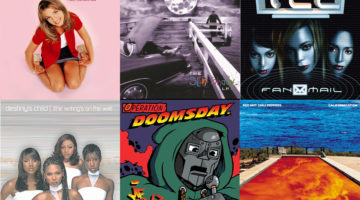 “When are y’all gonna stop calling out white people for saying the N-word at your shows?”
“When are y’all gonna stop calling out white people for saying the N-word at your shows?”
The question came from a young white woman at a BROCKHAMPTON concert in Seattle, Washington, in February during the brief Q&A section of their show.
It was immediately met with a litany of groans and rebuttals from the crowd, as the rap group onstage shifted uncomfortably. A number of audiences members even began booing the girl. Kevin Abstract, who had been holding the microphone for the woman as she asked her question, immediately withdrew it and walked away. The rest of the band exchanged a few words amongst themselves, before group member Ameer Vann stood up and walked to the front of the stage.
“Y’all white people know better. Don’t say that sh*t,” he answered bluntly.
Although a majority of the crowd broke out into cheers and applause at his response, it can be said that many rap fans (mainly white ones) don’t necessarily understand or agree with this concept. Because of the nonchalance and frequency with which the N-word is used by rappers, non-black fans often interpret this to mean that the phrase has become free to use universally, as if rappers could somehow give away permission to use it however one would like. Since the dawn of explicit rap in the 1980s, the question has repeatedly been asked again and again: can white people say the N-word when reciting rap lyrics?
The obvious answer is no. Because although not all rap fans are black, the culture behind rap music is entirely built on the African-American experience.
As Ice Cube once put it years ago during his days in NWA, rappers often act as “street reporters” who use their music to describe the experiences of black people in the U.S. They highlight common issues that plague many black neighborhoods, including police brutality, unequal employment opportunities, drug use, poverty, poor education, crime and mass incarceration. Yet they also use rap to display pride in African-American culture, share words of wisdom, tell their success stories and speak about their spiritual beliefs. In recent years, rap has also evolved to encompass a very glamorous lifestyle filled with expensive jewelry, lavish cars and mansions and big-bootied women.
Along with the evolution of rap, the N-word has also undergone a major evolution since its origin in early U.S. history. The word (as we know it) first came about in colonial America, and persisted during an era of slavery which lasted for over 200 years. It was used as a derogatory term when referring to black slaves (whereas “negro” or “colored” were considered less offensive), and used most often in the south where white supremacy was heavily enforced.
But over time (and this is where many people seem to get lost), the term was adopted by African Americans, who so frequently heard the term used toward themselves that they began using it toward one another. Eventually, pronunciation in the black community reduced the word from having a hard “-er” to just an “-a” at the end, and became a term of endearment among black individuals. Yet the original meaning of the word always remained a verbal weapon of the white population who used it in entirely different contexts than blacks used it amongst themselves. In these situations, it would be used to attack blacks, remind them of their painful and traumatic history in the U.S. and to reinforce an unequal power dynamic in which whites reigned supreme and blacks were deemed less-than.
This is why white people can’t repeat it in rap songs. Because despite the fun beats, the catchy lyrics and seemingly harmless tone of some rap music, the word is still powerful in and of itself. It’s used as a symbol of black pride, which white people have undoubtedly tried to smother countless times throughout history. And this is not to say that all white people are racist or wish to use the N-word as a part of their daily vocabulary. This is merely a reminder that what’s used by some cultures in America should not necessarily be shared with all cultures. Sometimes, it’s just a matter of looking at history, acknowledging that something painful has been remade into something great and leaving it alone.
The fixation that many white people have with wanting to use the N-word is concerning to say the least. The question as to why one would even want to use the word can be met with various answers: some believe it’s cool and hip, others want to feel like they belong. Some may even believe that it can be adopted into a term of endearment among all races. Yet each of these arguments is based on the blatant disregard for African Americans’ shared painful history, which continues even today as our nation has some of the largest mass incarceration and police brutality rates in the world.
So if you’re a white person who loves rap, and ever feel the urge to shout or even whisper “n—a” along with the lyrics of a rap song, consider where you fit in that equation. And then politely censor yourself the way you used to when you were rapping along to dirty lyrics in front of your parents as a child.












